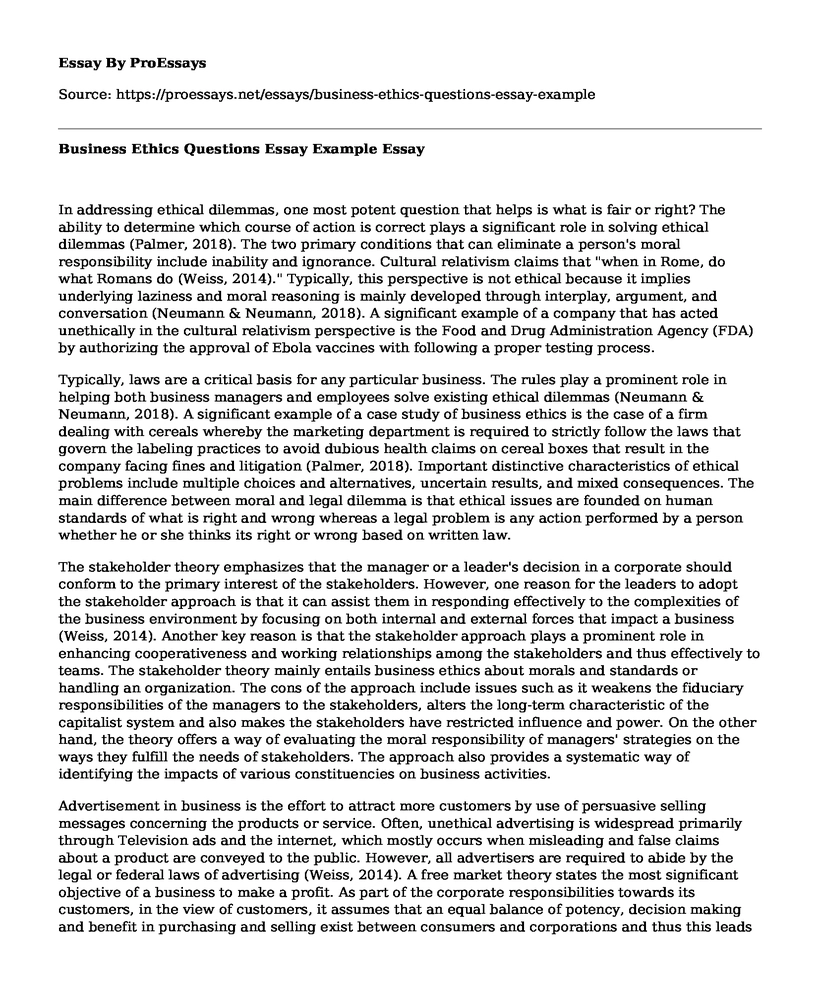In addressing ethical dilemmas, one most potent question that helps is what is fair or right? The ability to determine which course of action is correct plays a significant role in solving ethical dilemmas (Palmer, 2018). The two primary conditions that can eliminate a person's moral responsibility include inability and ignorance. Cultural relativism claims that "when in Rome, do what Romans do (Weiss, 2014)." Typically, this perspective is not ethical because it implies underlying laziness and moral reasoning is mainly developed through interplay, argument, and conversation (Neumann & Neumann, 2018). A significant example of a company that has acted unethically in the cultural relativism perspective is the Food and Drug Administration Agency (FDA) by authorizing the approval of Ebola vaccines with following a proper testing process.
Typically, laws are a critical basis for any particular business. The rules play a prominent role in helping both business managers and employees solve existing ethical dilemmas (Neumann & Neumann, 2018). A significant example of a case study of business ethics is the case of a firm dealing with cereals whereby the marketing department is required to strictly follow the laws that govern the labeling practices to avoid dubious health claims on cereal boxes that result in the company facing fines and litigation (Palmer, 2018). Important distinctive characteristics of ethical problems include multiple choices and alternatives, uncertain results, and mixed consequences. The main difference between moral and legal dilemma is that ethical issues are founded on human standards of what is right and wrong whereas a legal problem is any action performed by a person whether he or she thinks its right or wrong based on written law.
The stakeholder theory emphasizes that the manager or a leader's decision in a corporate should conform to the primary interest of the stakeholders. However, one reason for the leaders to adopt the stakeholder approach is that it can assist them in responding effectively to the complexities of the business environment by focusing on both internal and external forces that impact a business (Weiss, 2014). Another key reason is that the stakeholder approach plays a prominent role in enhancing cooperativeness and working relationships among the stakeholders and thus effectively to teams. The stakeholder theory mainly entails business ethics about morals and standards or handling an organization. The cons of the approach include issues such as it weakens the fiduciary responsibilities of the managers to the stakeholders, alters the long-term characteristic of the capitalist system and also makes the stakeholders have restricted influence and power. On the other hand, the theory offers a way of evaluating the moral responsibility of managers' strategies on the ways they fulfill the needs of stakeholders. The approach also provides a systematic way of identifying the impacts of various constituencies on business activities.
Advertisement in business is the effort to attract more customers by use of persuasive selling messages concerning the products or service. Often, unethical advertising is widespread primarily through Television ads and the internet, which mostly occurs when misleading and false claims about a product are conveyed to the public. However, all advertisers are required to abide by the legal or federal laws of advertising (Weiss, 2014). A free market theory states the most significant objective of a business to make a profit. As part of the corporate responsibilities towards its customers, in the view of customers, it assumes that an equal balance of potency, decision making and benefit in purchasing and selling exist between consumers and corporations and thus this leads to some controversies in customer-business relationships (Ameer & Halinen, 2019). The idea of social contract is also based on certain obligations that corporate has towards its consumers and society whereby ethical standards serve as moral foundations of both corporates and customer-stakeholder relationship. Climate change and global warming both pose a severe threat to the environment (Weiss, 2014). The social media and scientists put much emphasis on these two conditions as significant threats to the world's environment, but basically, this is just "hype" because climate change can be mitigated to an extent because human activities cause the release of greenhouse gases.
Conclusion
From the crises illustrated in the Johns-Mansville and Exxon Valdez readings, the situations could have been avoided by having an excellent quality control (QC) while on the other end they can be managed responsibly by always expecting the unexpected inherent hazard, planning for the worst and hoping for the first rate.
References
Ameer, I., & Halinen, A. (2019). Moving beyond ethical decision-making: a practice-based view to study unethical sales behavior. Journal of Personal Selling & Sales Management, 1-20.
Neumann, C. B., & Neumann, I. B. (2018). Conclusion: Culture, Power, Ethics. In Power, Culture and Situated Research Methodology (pp. 101-107). Palgrave Macmillan, Cham.
Palmer, D. (2018). Doing Well by Doing Good (?): Rethinking Corporate Social Responsibility Through an Examination of Social Purpose Corporations and Stakeholder and Neoliberal Theories.Weiss, J. W. (2014). Business ethics: A stakeholder and issues management approach. Berrett-Koehler Publishers.
Cite this page
Business Ethics Questions Essay Example. (2022, Nov 09). Retrieved from https://proessays.net/essays/business-ethics-questions-essay-example
If you are the original author of this essay and no longer wish to have it published on the ProEssays website, please click below to request its removal:
- Reflecting on the End of Racial Representation - Chapter Discussion
- Anthropology Analysis of Attitude Towards People Depending on the Profession
- Lack of Money Leads to Uncovering of Fake Friend - Essay Sample
- Indigenous Community Welfare: Impact & Development - Essay Sample
- Paper Example on Abortion: A Conundrum of Contention
- Essay Sample on Unveiling the Human Sexual Nature: Monogamy vs. Repression
- Challenges of Bias in IQ Tests and Strategies for Addressing Worldview Conflicts in Professional Settings







